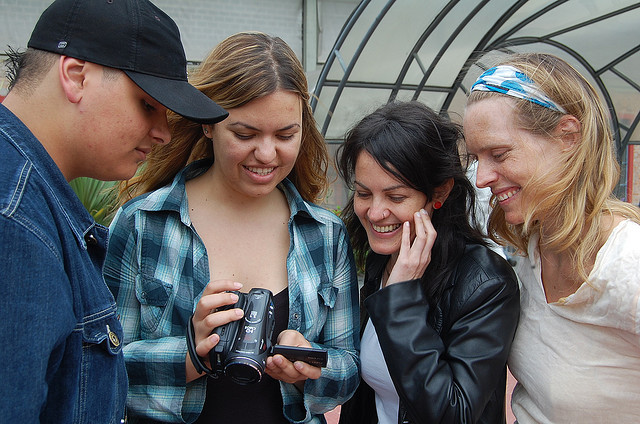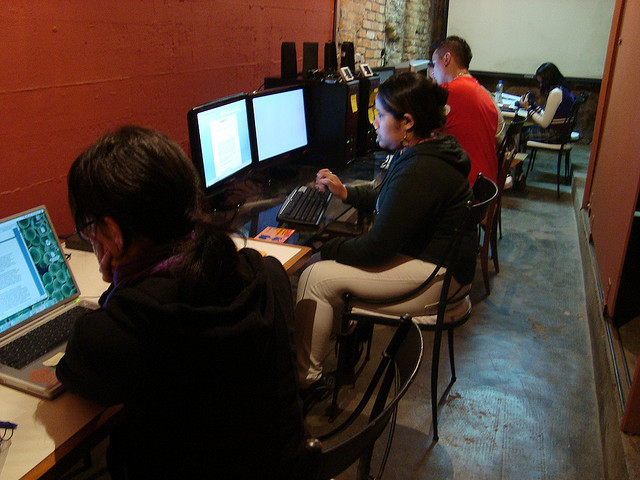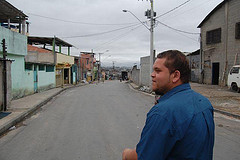Rethinking Disadvantage: Community Producers as Entrepreneurs
Rethinking Disadvantage: Community Producers as Entrepreneurs
With the Brazil Livelihood program, Video Volunteers is looking to fill a crucial niche in NGO media programs – sustainability. This focus on the finances of community media requires a shift in focus from ‘social change’ to ‘entrepreneurism’. Entrepreneurialism is about taking risks, thinking laterally and being confident in your abilities and proud of your identity. In order to foster these elements, the program works with producers to turn disadvantage on its head and equip producers with the skills needed to set up and run viable media businesses.
As the cost of technology continues to plummet, it is ever more possible for community media to be financially sustainable – but promoting a culture of entrepreneurism must become a priority. There are many participatory media programs around the globe that enable marginalized communities to create media products. However, these projects are often short-lived. Many last only six to eight weeks. After the conclusion of the program, participants file back to their former jobs. It is often difficult to glean long-term impact from these short-term projects. This issue has been a problem for Video Volunteers too. Through the Brazil Livelihood program, Video Volunteers is responding to this challenge by creating an innovative sustainability model for community media, where nonprofit media is mobilized to create stable careers—not short-term programs.
If marginalized people—particularly young people—are given access to resources and support, they can then use their energy and drive to create small entrepreneurial businesses. There is a wealth of young creative talent and energy in São Paulo’s favelas. The resources they need, such as cameras and video equipment, are becoming increasingly accessible as the prices for these items fall. While these elements are in place, the connection between these young people and sustainable video careers has not been made. This is precisely the bridge Video Volunteers is looking to build with its Brazil Livelihood program.

“We are convinced, as we always are with our community producers in India, that there is an abundance of undiscovered talent and potential in the world; we need to start tapping into it. When you give people opportunities, and you help them find their voice there is no end to what they can achieve.”
— Jessica Mayberry, Founding Director, Video Volunteers
Entrepreneurship – innate or taught?
In the Brazil Livelihood program, it was necessary for the fellows to be entrepreneurs. Starting a business requires a willingness to innovate and take risks. Therefore, choosing fellows with a sharp drive and keen sense of innovation was of major importance during the selection process.
It is difficult to say if entrepreneurship can be taught or if it is an innate quality. Business skills are easy to teach. Personal drive and motivation is another thing. Not everyone is an entrepreneur. This was a concern: can VCU.br inspire entrepreneurship? Can it be taught? Or is it a natural inclination? These questions drove the program forward.
Anti-Cinema Collective
“Whilst in Brazil we met with a group of five young people from Rio de Janeiro who together run the Anti-Cinema Collective. This group organize film screenings in their favela and also make films about local community issues. These inspirational and vivacious young men were in fact just the kind of media entrepreneurs we were working to develop in VCU.br. But we realized they would not appreciate such a corporate label.
We asked them to talk about money. ‘How is the collective funded? How much does it cost? Do you make money doing this? If so, how much?’ Their response was incredulous – “why are you asking us? We don’t do this for money!”
The collective only saw their work in the context of struggle. They were motivated by social change, not money, and had no desire to talk figures. They were willing to speak about the sources of some of their funding; the government grants they had received, and also their personal financial contributions to the collective.
Our key learning from our discussions with the collective was that people involved in struggle shy away from talking the financial language of economics. They feel that to talk about the importance of money is to be corporate and thus is against their values. We had a hard time getting media NGOs and young favela activists to talk about money, which is paradoxical because if they don’t start thinking about money their work can’t survive.”
— Stalin K., Managing Trustee, Video Volunteers
 VCU.br Entrepreneurs
VCU.br Entrepreneurs
Throughout the duration of the program, it became clear that the VCU.br fellows were entrepreneurs. All fellows were committed to forging a new career in video, expanding their creativity, and cultivating the professional skills needed to launch a business. Brazil Livelihood Fellow Rafael Trevigno wrote a proposal to the Brazilian government requesting funds which would allow him to create video projects in the slums. Ricardo Barbosa successfully pursued an internship with a television station he came to know as a result of the project.
Leila, one of the entrepreneurs, gave this clear insight. The idea would eventually lead to the innovative idea for a community media collective built by the entrepreneurs:
“My experience in VCU.br was so good and the other Video Producers are such interesting people. Next year, I hope we’ll get together to make some production companies. I want to really go ahead with videos, and I think I also have the capacity for fiction, too. I don’t want everyone here to go off on their own and leave the group, so I’m thinking about how to make the idea of a group production company happen. Some of us love to write, some like to produce, others to edit. For me, we have a production company right here.”
— Leila de Jesus Costa, 24 years old
Turning Disadvantage on its Head: Rethinking Backgrounds, Building Opportunity
One of the most critical components of the Brazil Livelihood program was to inspire the fellows to rethink their disadvantaged background as an advantage. All Fellows came from marginalized communities and expressed frustration at the limitations holding their professional careers back. Their identities have, in large part, been shaped by the images and expectations assigned to them as people of the favelas. If they are to succeed as entrepreneurs they must be able to provide something unique to the video market—and have the confidence in themselves to do it.
To respond to this, during one exercise, the entrepreneurs were asked to pitch themselves as producers to potential clients. One fellow wrote this:
 “My name is Allan Jones, I’m 24 years old and live in Guarulhos municipality of São Paulo State. My parents were born in the Amazon. My mother works as a seamstress and my father, I do not know who he is. I graduated high school only last year because the work I had to do did not allow me to study. I’ve worked in several areas, including as an installer of air conditioning and around this time I had the opportunity to meet several theaters and see many shows. It was there that sparked my desire to work with theater and learn video. Today I’m part of the project VCU.br which is about how young people can work as independent videomakers, and I want to work in the area of script and production. I’m making a video about community theater in my area: my video tells the story of Mrs. Santa Catarina, an independent artist. She is self-taught and without resources or support, but yet manages to run a theater workshop in the community of Vila Isabel, in Guarulhos.”
“My name is Allan Jones, I’m 24 years old and live in Guarulhos municipality of São Paulo State. My parents were born in the Amazon. My mother works as a seamstress and my father, I do not know who he is. I graduated high school only last year because the work I had to do did not allow me to study. I’ve worked in several areas, including as an installer of air conditioning and around this time I had the opportunity to meet several theaters and see many shows. It was there that sparked my desire to work with theater and learn video. Today I’m part of the project VCU.br which is about how young people can work as independent videomakers, and I want to work in the area of script and production. I’m making a video about community theater in my area: my video tells the story of Mrs. Santa Catarina, an independent artist. She is self-taught and without resources or support, but yet manages to run a theater workshop in the community of Vila Isabel, in Guarulhos.”
Allan’s narrative reveals some of the many forces holding the poor back in the big cities of the global south. Several themes reoccurred throughout the entrepreneurs writing: the massive distances the poor have to travel from their homes to work in the city centers; the high costs of public transportation; the need to support their families financially and the incredibly poor public schools. All expressed frustration at the lack of professional contacts available to them. Most of their choices to pursue a career in video and media had a modest beginning. In the case of Allan, he was inspired to pursue media because he ran into theater professionals while installing air conditioning units in a downtown building. Another entrepreneur was inspired to pursue a career in media after a TV producer gave him quick career advice while the producer passed through the favelas. He was sixteen at the time. Compare this to the wealth of career advice any young person of privilege receives by the time they turn 21.
Is it any wonder the fellows seem incredulous when they are told that their backgrounds are in fact a strength?
The ability to not only see—but celebrate—their backgrounds as positive for their professional development is a process that takes time. As the days go by, the entrepreneurs learn the step-by-step process of managing an independent video business; from identifying clients, writing proposals and creating a budget to ‘closing the deal.’ In addition, and more importantly, they are learning to tell and celebrate their personal stories. Being an entrepreneur, ultimately, is about finding your personal power and confidence in your own ideas—and your own story. Even if a fellow sends the most intense favela story to a television producer, that TV producer will always have the option of sending his own more ‘professional’ freelancers to cover it.
The VCU.br entrepreneurs need to learn how to convince potential clients that they have something other professionals do not— firstly, personal experience of the issue at hand; secondly, a better understanding of the issue; and thirdly, far better access. They need to be empowered to articulate their unique perspectives.
The Entrepreneurs’ Trump Card
They are uniquely positioned to tell stories of the favelas because they are from these communities. They live these stories. They know the people. They know the sights, sounds, smells and tastes of the favelas—and they know what stories need to be shared, what stories need to be brought to the world’s attention. No professional coming in from the outside can provide this wealth of knowledge or depth of background. This—this—is their unique niche in the São Paulo video market.
After a couple of hours of them slightly struggling to “get” this, one girl jumps up. She is Beatrice: ‘I see! It’s because we live here that we’re unique!’. ‘That’s it!’ everyone says, and from there, they start making the connections more easily. One woman, Leila, used to work handing out fliers on the sidewalk. She knows what it’s like to feel invisible on the street and that’s why she can tell an interesting story about street artists who also have to fight for the acknowledgment of passersby.
Entrepreneurs need to be their own advocates when convincing the market of their value. No one else can do this for them in the long term. The ability to do this comes not merely from self-expression or ‘voice,’ but is deeply rooted in self-reflection and self-awareness. The VCU.br fellows, comfortable with who they are and where they have come from, become a force to be reckoned with in the competitive media world as they establish themselves as successful community media entrepreneurs.

